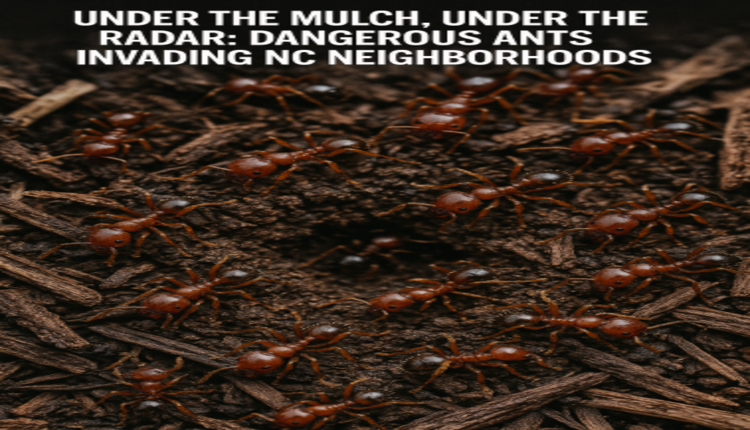At Atlantic Termite & Pest Control, we believe that being proactive is the best way to keep your home and family safe. That’s why it’s important to shine a light on an emerging pest problem in North Carolina: the Asian needle ant. While this ant may not be as well-known as fire ants or carpenter ants, it is quickly becoming a serious issue in local communities—hiding beneath the mulch and under the radar.
These aggressive ants pose threats to your health, your home, and the environment. Our team is here to help you understand this hidden danger and show you the best ways to protect your property with proven pest control strategies.
Understanding the Asian Needle Ant
The Asian needle ant (Brachyponera chinensis) is an invasive species originally from Southeast Asia. It was first discovered in the United States in the 1930s but has recently spread across the southeastern U.S., including throughout North Carolina. Unlike many common ants that travel in visible trails, Asian needle ants are solitary foragers, which makes them harder to detect until an infestation is well underway.
They prefer dark, moist environments and often build their nests under mulch, leaf litter, rotting wood, stones, or even inside potted plants. Because they are not obvious and don’t form massive visible colonies like fire ants, many homeowners are unaware of their presence until a sting—or infestation—occurs.
Health Risks Associated with Asian Needle Ants
The most alarming feature of Asian needle ants is their sting. These ants have a powerful venomous sting that can be extremely painful and, in some cases, lead to severe allergic reactions. In fact, research suggests that the sting of an Asian needle ant can trigger anaphylaxis—especially in individuals with a history of insect sting allergies.
What makes them even more dangerous is their stealthy nature. Since they don’t swarm or make themselves easily visible, you could encounter one unexpectedly while gardening, handling mulch, or simply enjoying your backyard.
If stung, symptoms may include:
- Localized swelling and redness
- Itching or burning at the sting site
- Difficulty breathing (in severe cases)
- Anaphylaxis, requiring immediate medical attention
If you or a family member is allergic to insect stings, having an epinephrine auto-injector on hand is strongly recommended.
Environmental Impact
The threat of Asian needle ants goes beyond human health. They are known to disrupt local ecosystems by aggressively outcompeting native ant species. Native ants play essential roles in seed dispersal, soil aeration, and overall ecological balance. When invasive species like Asian needle ants take over, they displace these beneficial ants and alter the natural environment.
This kind of disruption can have a ripple effect throughout your garden, your neighborhood, and the wider ecosystem. As a homeowner, being informed and proactive can help limit the spread and impact of this invasive species.
Identifying an Infestation
Asian needle ants are typically black or dark brown with lighter-colored mandibles and legs. They are about the same size as common house ants but behave very differently.
Here are signs to watch for:
- Solitary ants in shady, moist areas like under mulch, leaves, or flower pots
- Increased ant activity near wooden or damp areas
- Painful stings when outdoors
- Signs of ant activity during cooler months (they are active earlier in spring than most native ants)
Because these ants do not follow trails, spotting them takes a trained eye. That’s why scheduling a professional inspection can make all the difference in early detection.
Prevention and Control Measures
At Atlantic Termite & Pest Control, we offer custom solutions based on the behavior and biology of the pests we’re fighting. Here’s how you can help prevent an infestation of Asian needle ants:
1. Reduce Moisture:
Fix leaky outdoor faucets, ensure proper drainage, and avoid overwatering your yard or garden.
2. Remove Organic Debris:
Clear leaf piles, rotting wood, and excess mulch that can serve as nesting grounds.
3. Seal Entry Points:
Inspect your home’s foundation, windows, and doors for cracks or gaps that ants might use to enter.
4. Use Professional Baiting and Treatment:
Asian needle ants are resistant to traditional baiting techniques. Our trained technicians use advanced strategies tailored to this species, ensuring long-term results.
5. Regular Inspections:
An annual pest inspection can catch early signs of infestation and help prevent them from becoming a costly problem.
Our Commitment to Your Safety
At Atlantic Termite & Pest Control, your family’s safety and comfort are our top priorities. We understand the unique pest threats facing North Carolina homeowners, and we’re committed to using safe, environmentally responsible methods to protect your home.
When it comes to Asian needle ants, time is of the essence. Early intervention can prevent health risks, property damage, and environmental impact. Our licensed professionals are trained in the latest pest control techniques, and we’re always here to provide fast, effective, and friendly service.

Leave a Reply